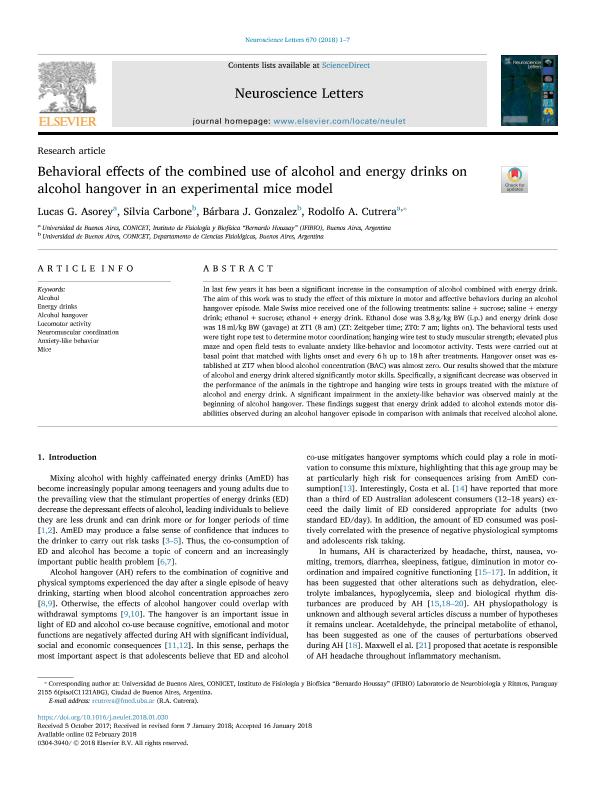Mostrar el registro sencillo del ítem
dc.contributor.author
Asorey, Lucas Gustavo

dc.contributor.author
Carbone, Silvia Elena

dc.contributor.author
Gonzalez, Bárbara J.
dc.contributor.author
Cutrera, Rodolfo Angel

dc.date.available
2020-03-12T20:38:12Z
dc.date.issued
2018-03
dc.identifier.citation
Asorey, Lucas Gustavo; Carbone, Silvia Elena; Gonzalez, Bárbara J.; Cutrera, Rodolfo Angel; Behavioral effects of the combined use of alcohol and energy drinks on alcohol hangover in an experimental mice model; Elsevier Ireland; Neuroscience Letters; 670; 3-2018; 1-7
dc.identifier.issn
0304-3940
dc.identifier.uri
http://hdl.handle.net/11336/99381
dc.description.abstract
In last few years it has been a significant increase in the consumption of alcohol combined with energy drink. The aim of this work was to study the effect of this mixture in motor and affective behaviors during an alcohol hangover episode. Male Swiss mice received one of the following treatments: saline + sucrose; saline + energy drink; ethanol + sucrose; ethanol + energy drink. Ethanol dose was 3.8 g/kg BW (i.p.) and energy drink dose was 18 ml/kg BW (gavage) at ZT1 (8 am) (ZT: Zeitgeber time; ZT0: 7 am; lights on). The behavioral tests used were tight rope test to determine motor coordination; hanging wire test to study muscular strength; elevated plus maze and open field tests to evaluate anxiety like-behavior and locomotor activity. Tests were carried out at basal point that matched with lights onset and every 6 h up to 18 h after treatments. Hangover onset was established at ZT7 when blood alcohol concentration (BAC) was almost zero. Our results showed that the mixture of alcohol and energy drink altered significantly motor skills. Specifically, a significant decrease was observed in the performance of the animals in the tightrope and hanging wire tests in groups treated with the mixture of alcohol and energy drink. A significant impairment in the anxiety-like behavior was observed mainly at the beginning of alcohol hangover. These findings suggest that energy drink added to alcohol extends motor disabilities observed during an alcohol hangover episode in comparison with animals that received alcohol alone.
dc.format
application/pdf
dc.language.iso
eng
dc.publisher
Elsevier Ireland

dc.rights
info:eu-repo/semantics/openAccess
dc.rights.uri
https://creativecommons.org/licenses/by-nc-sa/2.5/ar/
dc.subject
ALCOHOL
dc.subject
ALCOHOL HANGOVER
dc.subject
ANXIETY-LIKE BEHAVIOR
dc.subject
ENERGY DRINKS
dc.subject
LOCOMOTOR ACTIVITY
dc.subject
MICE
dc.subject
NEUROMUSCULAR COORDINATION
dc.subject.classification
Neurociencias

dc.subject.classification
Medicina Básica

dc.subject.classification
CIENCIAS MÉDICAS Y DE LA SALUD

dc.title
Behavioral effects of the combined use of alcohol and energy drinks on alcohol hangover in an experimental mice model
dc.type
info:eu-repo/semantics/article
dc.type
info:ar-repo/semantics/artículo
dc.type
info:eu-repo/semantics/publishedVersion
dc.date.updated
2020-03-05T15:01:05Z
dc.journal.volume
670
dc.journal.pagination
1-7
dc.journal.pais
Irlanda

dc.journal.ciudad
Shannon
dc.description.fil
Fil: Asorey, Lucas Gustavo. Consejo Nacional de Investigaciones Científicas y Técnicas. Oficina de Coordinación Administrativa Houssay. Instituto de Fisiología y Biofísica Bernardo Houssay. Universidad de Buenos Aires. Facultad de Medicina. Instituto de Fisiología y Biofísica Bernardo Houssay; Argentina
dc.description.fil
Fil: Carbone, Silvia Elena. Universidad de Buenos Aires. Facultad de Medicina. Departamento de Ciencias Fisiológicas; Argentina. Consejo Nacional de Investigaciones Científicas y Técnicas. Oficina de Coordinación Administrativa Houssay; Argentina
dc.description.fil
Fil: Gonzalez, Bárbara J.. Universidad de Buenos Aires. Facultad de Medicina. Departamento de Ciencias Fisiológicas; Argentina
dc.description.fil
Fil: Cutrera, Rodolfo Angel. Consejo Nacional de Investigaciones Científicas y Técnicas. Oficina de Coordinación Administrativa Houssay. Instituto de Fisiología y Biofísica Bernardo Houssay. Universidad de Buenos Aires. Facultad de Medicina. Instituto de Fisiología y Biofísica Bernardo Houssay; Argentina
dc.journal.title
Neuroscience Letters

dc.relation.alternativeid
info:eu-repo/semantics/altIdentifier/doi/http://dx.doi.org/10.1016/j.neulet.2018.01.030
dc.relation.alternativeid
info:eu-repo/semantics/altIdentifier/url/https://www.sciencedirect.com/science/article/pii/S0304394018300363
Archivos asociados
